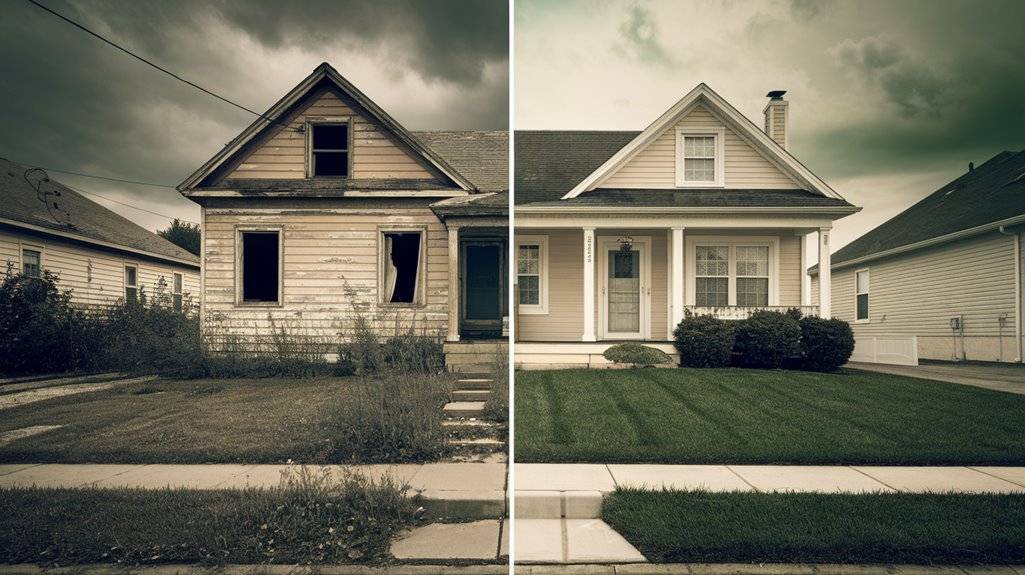Facing financial struggles can make choosing between a short sale and foreclosure tough. The decision affects your credit score, future home buying, and legal status. It’s a heavy burden to carry. You might feel stuck, unsure of the right path.
The stress builds as both options hurt your finances. Your credit could tank, delaying dreams of owning a home again. Legal issues might haunt you. The fear of making the wrong choice grows stronger every day. But there’s hope if you understand the differences.
A short sale often causes less damage than foreclosure. A short sale is usually the best option to protect your financial future. With the right guidance, you can move forward confidently. This blog will guide you to make the best choice and ease your worries.
Key Takeaways
- Short sales cause less credit damage, with a 100-150 point drop, compared to foreclosure’s harsher impact.
- Short sales delay new mortgages by 2-3 years, while foreclosures can delay them up to 7 years.
- Short sales require lender approval and quick action, offering more control over the sale process.
- Foreclosures risk taxable income from forgiven debt, unlike short sales which often avoid this issue.
- Short sales reduce long-term financial harm, making them generally a better option than foreclosure.
Understanding the Short Home Sale

As you navigate the complexities of a short home sale, understand that it’s a process where you sell your property for less than the mortgage owed, requiring lender approval to proceed. You’ll also need to consider the impact on your credit, which, while significant, often carries less severe consequences compared to foreclosure, alongside implications for future homeownership.
Let’s break down these critical aspects—process, credit effects, lender negotiations, and long-term outcomes—to guide your decision with clarity. Additionally, a short sale can be an alternative to selling a house as-is condition, especially when financial constraints prevent necessary repairs before listing.
Process of Short Sale
A short sale lets you sell a home for less than the mortgage owed. It involves a clear but tricky process. First, show your lender proof of financial struggle with documents. Submit bank statements and a hardship letter for approval. If they agree, list the property for sale quickly.
Then, use good marketing to draw in buyers fast. Negotiate with buyers to get a fair offer. Ensure the offer works for your lender’s approval. Send this offer to the lender for a detailed check. If approved, move to closing and transfer the home. Finally, stay active to avoid delays in the process. Delays might risk losing the deal altogether.
Impact of Short Sale on Credit
A short sale affects your credit score noticeably but less harshly than foreclosure. Credit agencies mark it as “settled for less than owed.” This can lower your score by 100-150 points. The exact drop depends on your initial credit standing.
Recovery is achievable if you adopt good financial habits. Pay your bills on time every month. Reduce your debt as much as possible. Check your credit report for any mistakes. If you stay consistent, improvement can begin in two years. Responsible actions will rebuild your credit over time.
Future Homeownership When Selling in Short Sale
A short sale impacts your future homeownership by delaying your ability to get a new mortgage. It’s less harmful than foreclosure, but waiting periods still apply for new loans. If you rebuild credit, these waits are often shorter.
You may wait three years for an FHA-backed loan if you improve your credit score. Veterans seeking a VA loan might need two years to qualify again. Staying proactive helps; monitor credit and pay bills on time. If you save for a down payment, future homeownership becomes possible. With effort, you can overcome a short sale setback.
Lender Approval in Short Sale
Lender approval is vital for a successful short sale. Without it, your deal cannot proceed. You must understand the lender’s specific requirements. They often need detailed financial papers and hardship proof. If you communicate well, the process becomes smoother. Respond quickly to their requests to avoid delays.
To make this easier, follow these steps:
- Collect Documents: Gather income statements, bank records, and hardship letters. These meet the lender’s needs.
- Submit Early: Send all documents to the lender promptly. This prevents unnecessary delays.
- Stay Connected: Keep in touch with the lender. Address any concerns fast.
If you stay active, your approval chances improve.
Less Severe Consequences in Short Sale
A short sale brings less harm to your financial future compared to foreclosure. It often causes smaller damage to your credit score. This means you can recover faster if you choose this option. You might also avoid harsh judgment from others. A short sale looks like a responsible choice to many people.
This decision can help your mental health by cutting stress. If you pick a short sale, shame may lessen too. You take charge by negotiating with lenders directly. Such a move reduces long-term problems for your finances. It also keeps your dignity and builds a better recovery path.
Understanding the Home Sale in Foreclosure

When you’re facing foreclosure, understanding the process of selling your house during this period is critical to managing your options. You’ve gotta consider how this sale impacts future homeownership and the legal consequences that might follow, as they can shape your financial recovery.
Also, recognize that selling in foreclosure often offers a faster resolution, potentially sparing you prolonged stress and uncertainty. For those in St. Louis County, MO, we can provide a fair cash offer within 24 hours to help navigate this challenging situation.
Process of Selling a House in Foreclosure
Selling a house in foreclosure is tricky but manageable with the right steps. You must act quickly to succeed. If you delay, the lender might force an auction with little price control.
Follow these clear steps to handle the situation:
- Find an Expert: A foreclosure specialist can guide you through possible solutions.
- Check Deadlines: Learn key dates, like the Redemption Period, to save your home.
- Organize Papers: Collect financial documents if you need to negotiate with lenders.
Stay focused and informed, as knowledge helps you stay in charge.
Future Homeownership when selling a house in Foreclosure
Selling a home in foreclosure affects your chance to own another home later. A foreclosure can delay your next purchase. Waiting periods for new mortgages may last up to seven years. If you want a conventional loan, prepare for this long wait. You must rebuild your credit during this time to qualify.
Tax issues might also arise if your lender forgives some debt. This forgiven amount could be taxable income. If you’re unsure, consult a tax professional for clear advice. Planning now helps you understand these impacts. Strategic steps today can shape when you buy a home again.
Legal Consequences when selling a property in Foreclosure
Selling a property in foreclosure involves serious legal consequences. You must understand these risks to avoid major issues. If you ignore laws, you could face lawsuits or penalties.
Consider these important legal points:
- Legal Defenses: You can fight foreclosure if mistakes were made. Speak to a lawyer about errors like wrong notices.
- Tax Implications: If debt is forgiven, you might owe taxes. Check with the IRS to know your duties.
- Contractual Risks: Breaking lender rules during a sale creates problems. Always review agreements to stay safe.
Faster Resolution when selling in Foreclosure
Selling your home during foreclosure can bring a quick solution. It cuts down the long wait of the process. If you choose an auction, the sale often wraps up in weeks. This speed helps you avoid months of worry.
Bidder competition also speeds up the sale significantly. When many buyers want your home, offers arrive fast. They push the deal to close sooner than expected. You won’t face delays from bank approvals. If stress weighs on you, an auction could ease it. Take charge and resolve foreclosure quickly with this approach.
Conclusion
In conclusion, deciding between a short sale and foreclosure is crucial for your financial future. If you choose a short sale, you might avoid severe credit damage. Should foreclosure happen, recovery could take much longer.
If you’re struggling, know that we buy houses for cash to ease your burden. When you opt for a quick sale, stress can lessen. We aim to help you move forward swiftly.
Contact us at Freedom Path Investors for immediate assistance with your property. We are ready to guide you through this tough time. Let’s find a solution together today.







